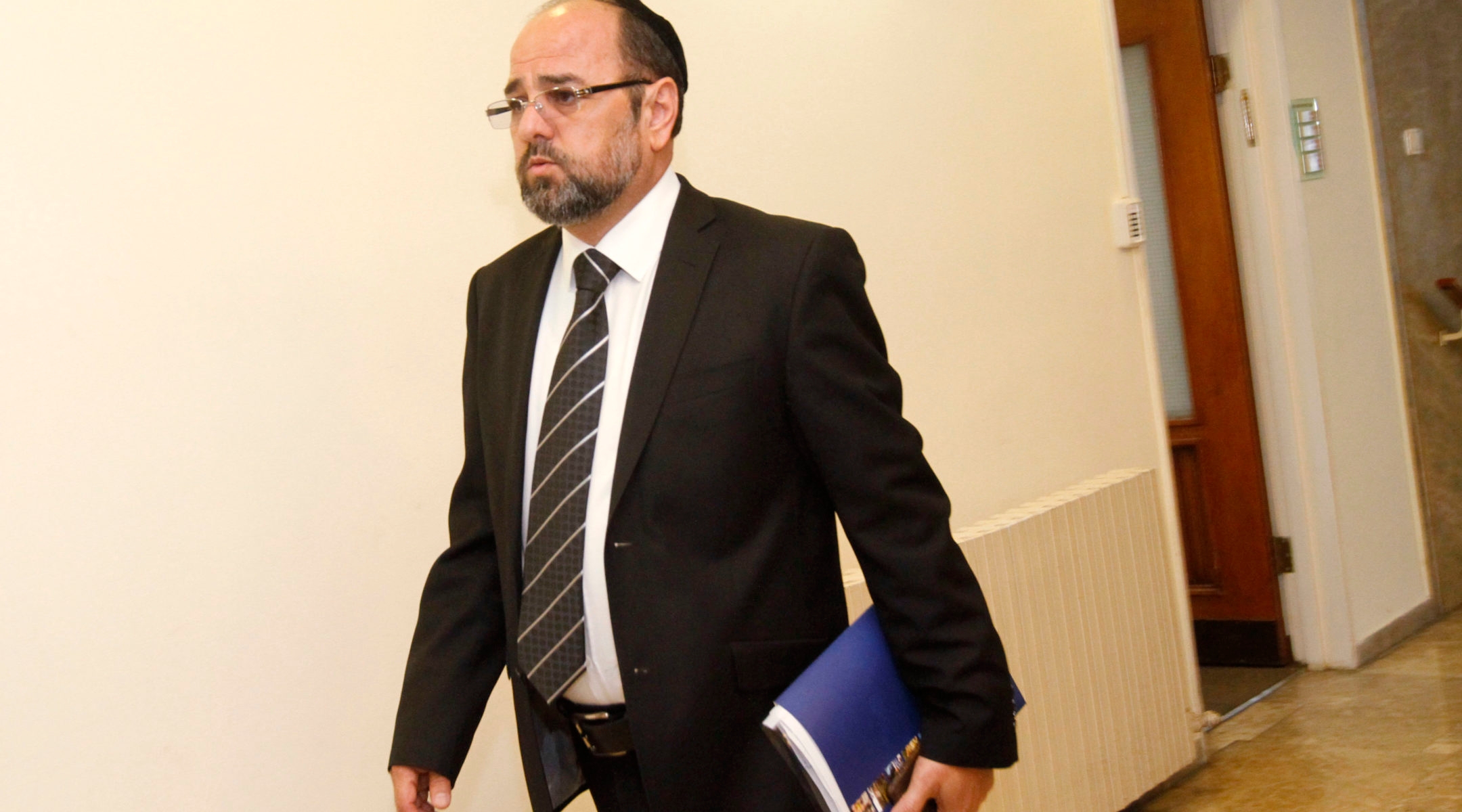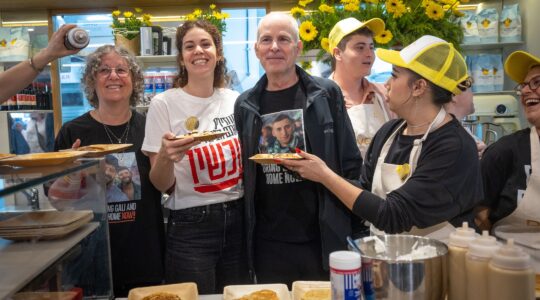
Rabbi Alona Lisitsa, a Reform rabbi, participated in a religious council in in Mevasseret Zion, a town west of Jerusalem, May 2012. (Rabbi Alona Lisitsa Facebook Page)
JERUSALEM (JTA) — After a Jerusalem-area’s religious council allowed a female Reform rabbi to participate in its proceedings, some advocates of liberal Judaism in the country are hailing their inroads into the Orthodox-dominated religious infrastructure.
At the beginning of May, the Orthodox members of the religious council in Mevasseret Zion, a town west of Jerusalem, agreed to convene a meeting with the participation of Rabbi Alona Lisitsa. The 41-year-old rabbi is an immigrant from Kiev and received her rabbinic ordination from Hebrew Union College-Jewish Institute of Religion in Jerusalem.
“This isn’t just a victory for the Reform Movement,” Lisitsa said. “This is a victory for democracy in Israel.”
She speaks of the 200 dues-paying families in Kehilat Mevasseret and “many more” who come for a bar or bat mitzvah.
“Thousands attend our Yom Kippur prayers. We are easily the largest congregation in town,” she said.
Like hundreds of similar bodies across the nation, Mevasseret Zion’s religious council allocates taxpayers’ money for an array of religious services such as kashrut supervision, mikvah [ritual bath] maintenance, the building of synagogues and the payment of rabbis’ salaries.
In a decision dating back to the 1990s, the Supreme Court ruled that the religious services minister, a portfolio traditionally held by a haredi Orthodox or Modern Orthodox Zionist political party member, could not disqualify a Reform or Conservative (Masorti) Israeli from serving on a religious council.
However, in nearly every city where a non-Orthodox representative was appointed to a religious council, the remaining Orthodox members of the body refused to cooperate. As a result, in dozens of towns across the nation special “religious services supervisors” were appointed to replace the recalcitrant religious councils, essentially bypassing the Supreme Court decision.
Two decades later, some observers believe the Mevasseret Zion development — ordered by a court — could signal that the Orthodox establishment has reconciled itself to the permanency of the Reform and Conservative movements here.
But Religious Services Minister Yaakov Margi, a member of the haredi Orthodox Shas party, rejected the notion that Lisitsa’s participation constituted a sea change.
“All members of the religious council sign off on an affidavit that states that everyone is subordinate to the directives of the [Orthodox] Chief Rabbinate,” Margi said in a written statement responding to questions provided to JTA. His ministry, he added, would continue to provide budgets “in an egalitarian and accessible manner” to all.
In addition to the fight for equal representation on religious councils, the Israel Religious Action Center, the Reform movement’s legal arm, is fighting a number of additional battles. IRAC has succeeded in obtaining state funding for the building of two synagogues — one in Carmiel, a town in the Galilee, and another at Kibbutz Gezer, located between Jerusalem and Tel Aviv.
In a 6-year-old case now in front of the Israeli Supreme Court, IRAC is demanding that the state of Israel pay a salary to Rabbi Miri Gold, a female Reform rabbi who heads a congregation at Kibbutz Gezer. Like hundreds of Orthodox rabbis across the nation who receive salaries from the state, Gold performs all the duties of a rabbi for the liberal-minded residents of the kibbutz, who like all Israelis pay the taxes that fund rabbis’ salaries.
But Margi rejected the idea that Gold would be recognized as a rabbi. Rabbinical ordination approved by the Chief Rabbinate, he said, is required to be appointed as a state-paid rabbi, according to the law. “And it is good that this is the case,” he said.
That, however, is not true according to Orly Erez-Likhovski, a legal adviser at IRAC.
“The law says nothing whatsoever that would disqualify a Reform or Conservative person from being appointed as a rabbi of a neighborhood or a kibbutz,” he said.
In recent weeks, Margi has been bombarded by more than 5,000 emails and letters from Reform Jews around the world calling on him to authorize Gold’s appointment, according to Rabbi Gilad Kariv, executive director of the Reform movement in Israel.
Asked if he responded to these letters, Margi said via his spokesman that he did so “if the letters are pertinent” to the issue of Gold’s appointment. When the letters are the result of a “persecution complex” he refrains from answering, he added.
Meanwhile, the Masorti movement in Israel is not focusing its energies on getting members elected to religious councils, according to Yizhar Hess, the group’s executive director.
While Hess said he understood the importance of gaining liberal voices on the councils, the movement’s energies are being directed toward building communities. He reeled off a list of accomplishments.
“We have 64 communities across the nation. Our prayer book Va’ani Tefilati was on the best sellers’ list for four weeks. There are 230 children on the waiting list for preschools belonging to our Eshel Avraham congregation in Beersheba,” he said. “Our Noam youth group is constantly growing. Tens of thousands of Israelis have come into contact with Masorti Judaism, and there is municipal-level cooperation in dozens of towns and cities.”
Hess also pointed to findings released at the beginning of the year from a survey conducted by the Guttman Center.
Data not included in the published document, titled “A Portrait of Israeli Jews: Beliefs, Observance, and Values of Israeli Jews in 2009,”but revealed by journalist Shmuel Rosner showed that more Israelis defined themselves as Reform or Conservative than those who defined themselves as “haredi.”
When asked, “How would you define yourself religiously?” 4 percent of respondents said “Reform” and another 4 percent said “Conservative.” But only 7 percent said “haredi.”The 8 percent total for self-defined Reform and Conservative Israelis has jumped up from 5 percent in 1999 and 4 percent in 1991.
“That means well over half a million Israelis define themselves as either Reform or Conservative,” Hess said, “and that number will only grow.”
Nonetheless, a 2010 report by Bar-Ilan University professors Asher Cohen and Bernard Susser — “Reform Judaism in Israel: The Anatomy of Weakness” — argued that liberal expressions of Judaism had little chance of taking root in Israel.
“Haredi and Orthodox Jews are definitely not interested,” said Cohen. “They view ‘Reform’ as a highly negative term. Traditional-minded Jews whose day-to-day practice might resemble the sort of lifestyle led by Reform and Conservative Jews nevertheless view non-Orthodox forms of Judaism as somehow unauthentic and foreign. The synagogue they don’t go to is Orthodox.
“Jewish renewal groups such as Nigun Halev in Moshav Nahalal or Beit Tefila Israelit are popular among secular Israelis because they tend to leave God out of the equation and because they are perceived as authentically Israeli and not, as one person I interviewed put it, ‘an American update to a German invention.’ “
Cohen dismissed the Guttman Center survey results as being skewed by a large number of Israelis who chose Reform or Conservative not so much as a self-definition, but as a protest against the Orthodox establishment.
But Kariv of the Reform movement in Israel said that both the Guttman survey and the appointment of Lisitsa “signal in a clear way there is no practical way for the Orthodox establishment to prevent us from gaining legal and political equality. It is no longer possible to dismiss our activities in Israel or their impact on Israeli society.”
JTA has documented Jewish history in real-time for over a century. Keep our journalism strong by joining us in supporting independent, award-winning reporting.






